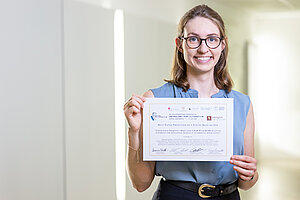July 29, 2021
Sarah Cwalina, research associate at the Fraunhofer Heinrich Hertz Institute (HHI), received this year’s Best Paper Award during the recent international IEEE MetroAutomotive Workshop. Together with her co-authors, she was recognized for the "Best Paper Presented by a Young Researcher”. Cwalina works at the institute’s "Photonic Networks and Systems" department.
The award-winning paper is titled "Fiber-based Frequency Modulated LiDAR with MEMS Scanning Capability for Long-range Sensing in Automotive Applications.” It presents a novel concept of a fiber-based coherent LiDAR (light detection and ranging) for use in driver assistance systems. The researchers developed the new concept in the collaborative Fraunhofer PREPARE-project MELINDA. PREPARE is a funding line by Fraunhofer Society aimed at sophisticated preliminary research across institutes to prepare for new business areas. Alongside Cwalina, Fraunhofer HHI researchers Dr. Christoph Kottke, Dr. Volker Jungnickel, Prof. Ronald Freund, Dr. Patrick Runge and Pascal Rustige contributed to the work. Scientists from Fraunhofer FHR and Fraunhofer ISIT were also involved.
LiDAR technology will play a key role in the further development of driving assistance systems for highly automated driving: LiDAR sensors interplay with cameras and radar sensors to perceive surroundings, detect obstacles, measure distances and thus ensure greater safety and efficiency in road traffic. Challenges for future LiDAR sensors include reliability in strong sunlight or fog and higher resolution over greater distances.
Cwalina’s prized paper addresses these challenges through a holistic system design involving coherent detection (Fraunhofer HHI), fiber-based optics (Fraunhofer HHI), sparse sensing (Fraunhofer FHR), and a 2D microelectromechanical scanner (Fraunhofer ISIT). Sparse sensing captures only a reduced image of the environment. This shortens the acquisition time and relaxes/eases the 2D scanner requirements. The team compared the methods Deep Learning and Compressed Sensing to reconstruct the full scene. The novel system will improve environment detection at long ranges and ensure a safer operation of driver assistance systems, especially at higher speeds.
The award was presented during the first edition of the IEEE MetroAutomotive Workshop, which was held virtually on July 2, 2021. The workshop displays latest results of scientific and technological research for the automotive industry, with a special focus on automotive measurement and sensing technologies.
